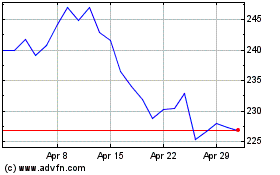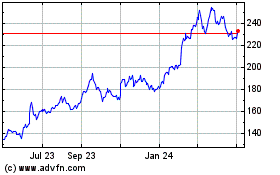Car Sales Start Year at Uneven Pace -- WSJ
February 02 2018 - 3:02AM
Dow Jones News
By Adrienne Roberts and Mike Colias
This article is being republished as part of our daily
reproduction of WSJ.com articles that also appeared in the U.S.
print edition of The Wall Street Journal (February 2, 2018).
Auto makers on Thursday reported underwhelming U.S. sales in
January, signaling the car industry is getting off to a relatively
muted start to 2018 despite a confluence of positive economic
factors that tend to help vehicle sales.
Overall U.S. vehicle sales rose 1% in January, to 1.2 million,
according to Autodata Corp. The tally was padded by an extra
selling day compared to January 2017. The seasonally adjusted pace
of sales slipped to 17.1 million on an annualized basis, from 17.4
million a year earlier.
Analysts expect sales to cool in the initial months of 2018
following the strong pace set in the final months of last year.
Still, sales of profit-rich trucks and sport-utility vehicles
remain historically robust -- a welcome trend for domestic auto
makers that generally pursue high-margin sales over market
share.
General Motors Co. sold 198,548 vehicles in January, a 1.3%
increase from the same period in 2017. Ford Motor Co. reported a
6.3% decrease, selling 160,411 vehicles during the month. Each
reported higher selling prices and growth in truck sales, factors
that bode well for the bottom line.
Fiat Chrysler Automobiles NV continued to report sales declines,
the result of pulling back on deliveries to rental-car companies.
It said sales were down 13% in January, falling to 132,803, after
cutting rental sales in half during the month.
Toyota Motor Corp. reported a 16.8% increase to 167,056
vehicles, driven by sales of the Japanese auto maker's popular RAV4
crossover and the redesigned Camry sedan. The company's numbers
compare with a weak January 2017 and included an increase in sales
to rental-car customers.
Honda Motor Co.'s sales slipped 1.7%, to 104,542 vehicles, as
the auto maker struggled to produce enough crossover SUVs. Nissan
Motor Co. posted a 10% increase in sales to 123,538 units, a
January record for the Japanese auto maker. The gain reflected a
double-digit increase in sales of Nissan's SUVs and trucks and a
jump in rental sales.
Most car companies are trimming production in the first quarter,
according to WardsAuto.com, in anticipation of a softer
marketplace, a move that curbs inventories without having to resort
to ever-richer sales incentives.
AutoNation Inc., the nation's biggest dealership chain, on
Thursday forecast 16.8 million sales for the U.S. market in 2018, a
decline of about 2.3% from the prior year. The retailer said more
consumers will shift to buying "nearly new" cars or trucks due to
the increasing number of vehicles coming back to dealerships
following short-term leases.
Demand for new automobiles will be closely watched in the wake
of recent tax cuts and a surge in consumer spending. Car sales have
fared well since the financial crisis, increasing for seven
consecutive years before hitting a speed bump in 2017.
Forecasters expect another small decline this year. Much of the
pent-up demand for vehicles has been absorbed, while higher
interest rates could sway some would-be buyers into settling for a
used vehicle instead of buying new, analysts predict.
Still, strong economic underpinnings that typically bolster car
sales, such as low unemployment and wage growth, should keep sales
at historically high levels, analysts forecast.
Ford has seen more orders from small businesses and larger
companies, a sign that tax reforms may be encouraging commercial
customers to invest in upgrading or expanding their fleets, U.S.
sales chief Mark LaNeve said. Ford and GM each reported increases
in sales in January to contractors, delivery firms and other
commercial fleet buyers.
The industry's recent sales momentum, including booming demand
for profitable pickup trucks and SUVs, led to big investments by
several auto makers in North American factories and white-collar
operations. Ford is paying out $7,500 in profit-sharing to more
than 50,000 plant workers; Fiat Chrysler is also paying out sizable
profit-sharing checks, and an additional bonus due to a cut in the
corporate tax rate.
"January is typically a ho-hum month for auto sales following
the major holiday blowout sales we see at the end of the calendar
year," said Jessica Caldwell, executive director of industry
analysis at Edmunds.com. "Shoppers at this time of year are driven
by necessity."
Write to Adrienne Roberts at Adrienne.Roberts@wsj.com and Mike
Colias at Mike.Colias@wsj.com
(END) Dow Jones Newswires
February 02, 2018 02:47 ET (07:47 GMT)
Copyright (c) 2018 Dow Jones & Company, Inc.
Toyota Motor (NYSE:TM)
Historical Stock Chart
From Jun 2024 to Jul 2024

Toyota Motor (NYSE:TM)
Historical Stock Chart
From Jul 2023 to Jul 2024
